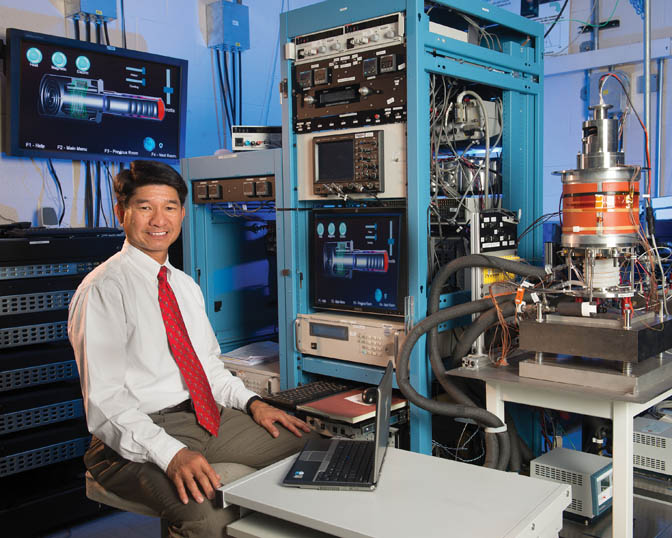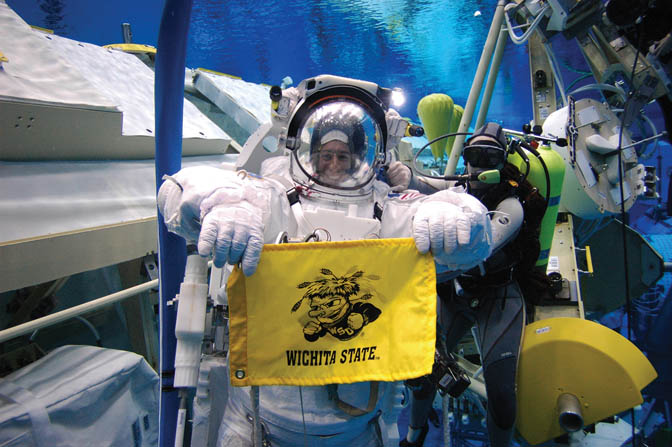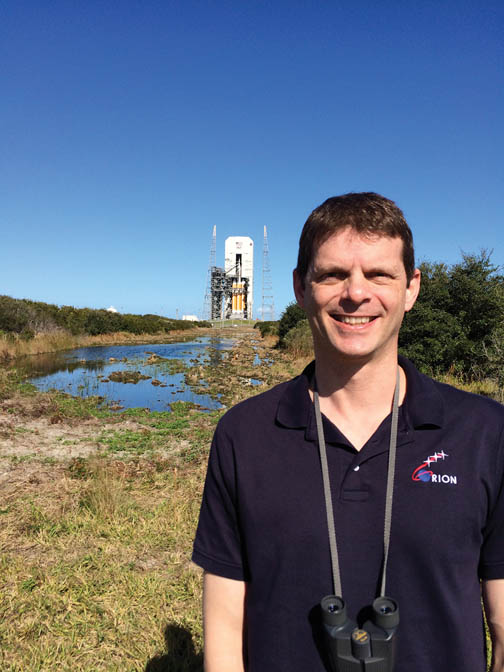
Phuoc Thai ’90 desperately wanted an education. But not one provided by a Communist regime. Plus, life was difficult for his family in Vietnam, since his older brother had fought alongside U.S. soldiers during the Vietnam War.
He remembered seeing video footage of a man walking on the moon in the home of a family who had the only black-and-white TV in his village. “I was so excited,” Thai says. “I said, ‘One day I’ll work for that company.’” But if he stayed in Vietnam, he knew that would be impossible. Getting that education would mean making steep sacrifices, which he did.
Thai holds bachelor’s and master’s degrees in electrical engineering and computer systems from two American universities, including Wichita State, and in less than a year will mark 25 years of working as a NASA researcher on projects that could have a huge impact on space travel and exploration.
Thai was in the fifth grade in 1975 when the Communist regime took over in South Vietnam, where his family owned a restaurant. As a child he’d always told his father that he wanted to learn until no one could teach him any more. But he felt he wasn’t getting a real education in school. “The teaching was so political” under the Communists, Thai relates.
So after a few months, he dropped out to help work a farm with his older brother, but he missed school. Driven by his goal of wanting an education, he left Vietnam – and his family – at age 16 and eventually spent 22 months in a refugee camp in Indonesia, waiting for a chance to come to the United States. “When they asked me where I wanted to go, I said, ‘Anywhere, just get me out of here.’”
Anywhere turned out to be Wichita, where he lived with a Vietnamese family whose patriarch had left Vietnam in 1975.
Because he wanted to experience an American education, Thai, at 17 1/2, enrolled in Wichita North High School as a freshman. He graduated with standout football star and future National Football League Hall-of-Famer Barry Sanders,
Thai likes to note, adding that he also had a talent that got him noticed. “I was kind of a popular guy since I was a photographer,” shooting pictures for the high school newspaper, he relates. “When the girls saw the camera, they would say, “Take my picture!’”
As a student at his adopted city’s hometown university, Wichita State, he continued to work the camera as a freelance photographer, and got a job as a dishwasher at the popular Paddy Ryan’s City Bar and Grill. When he mentioned that his family had owned a restaurant, the chef took him on as an assistant. Thai still makes his favorite recipe from the restaurant, an amaretto chicken dish
that has become a mainstay request from his friends during their annual fall golfing trips to Maryland.
He landed his dream job at NASA after graduating from Wichita State in 1990. But he was surprised at the location where he would work. “When I got the call from NASA Lewis in Cleveland, I scratched my head and wondered if NASA really was in Cleveland,” says Thai, who earned a master’s degree in 1999 from Cleveland State University and also met his wife in Cleveland.
The NASA John H. Glenn Research Center at Lewis Field in Cleveland is one of the space agency’s 10 major research and development field centers. Named for the famous Ohio astronaut in 1999, the center has an interesting history. During the 1960s and 1970s, for example, the Lewis Research Center conducted research and developed technologies in support of the space program, including the completion of the Zero Gravity Research Facility in 1966, which was designated as a National Historic Landmark in 1985.
Today, the center’s primary R&D purpose, Thai explains, is building experiments that are launched on rockets. His expertise is in microgravity behavior, studying how things act or react in states of gravity and weightlessness.
His current research into fuel technology could lead to the development of fueling stations in space. “Right now you have to carry enough fuel to get you to a destination and get you back,” Thai says. “If we can build a gas station in space, you won’t have to do that.” The ability to fuel up in space would increase the possibility of long-term human exploration missions beyond low Earth orbit.
His team of researchers is trying to solve problems such as measuring fuel levels in a zero gravity environment where the liquid is floating everywhere within the tank and how best to safely store the volatile fuels of liquid oxygen and hydrogen.
Over the course of his career at NASA, two accomplishments hold special significance for Thai: one because it indicated that his “dream employer” recognized his professional potential, and the other because he feels deeply that it’s important to help others less fortunate. More than 10 years ago now, he was selected to participate in NASA’s executive potential program for senior-level employees. The program’s mission is to help participants strengthen leadership and interpersonal skills, while providing personal and professional development opportunities.
In late 2005, Thai was the NASA center’s on-loan executive to the local United Way organization, to help raise funds for area charities. “I was proud,” Thai says, “to advocate for charity support and for helping out the really needy in the city.”
This past March, Thai was proud in a completely different way: proud to help welcome the Wichita State Shockers to the NCAA’s Sweet Sixteen – played in the city he’s called home for decades, Cleveland.

Phuoc Thai ’90 is one of many Wichita State-educated engineers who have launched successful aerospace careers at NASA.
Some of them, including Alex Kanelakos ’07, left, and Jeff Kowing ’88, below, began work at NASA well before their WSU graduations.
Stan Schaefer ’87 was enamored with space travel long before he earned an aeronautical engineering degree from Wichita State.
“I remember making my sister, Lisa, play ‘Lost in Space’ when we were kids,” he admits, adding, “It would be something to be able to travel to other planets.”
Schaefer, who holds the distinction of being the Johnson Space Center’s first WSU co-op student, has spent more than two decades working at NASA, and is now a mission operations directorate chief engineer at the Johnson Space Center in Houston.

Alex Kanelakos ’07 chose to study at Wichita State primarily because of its work-based learning and cooperative education programs. A Wallace Scholar at WSU, he put in five semesters, alternating between going to classes full time and working full time at the Johnson Space Center, where he now is a member of the Extra Vehicular Activity Team.
Jeff Kowing ’88, an electrical engineering grad, was also able to nurture his fascination with outer space by working as a co-op education student at the Johnson Space Center, where today he is involved with the Orion program.
In 2014, as the unmanned Orion spacecraft rocketed off its launch pad at Cape Canaveral, Fla., for its Exploration Flight Test-1, Kowing – who was recognized as a Space Flight Awareness Honoree – was watching from NASA’s VIP section about a mile and a half away.
Mallory Jennings ’10 always wanted to work at NASA, a desire that only grew after she moved to Houston with her family as a first grader.
While working toward her degree in mechanical engineering at Wichita State, she realized her dream by working at NASA as a co-op student for five semesters. Even before her graduation, she was offered a full-time job at the space agency, and is now a SPCE subsystem manager at the Johnson Space Center.





